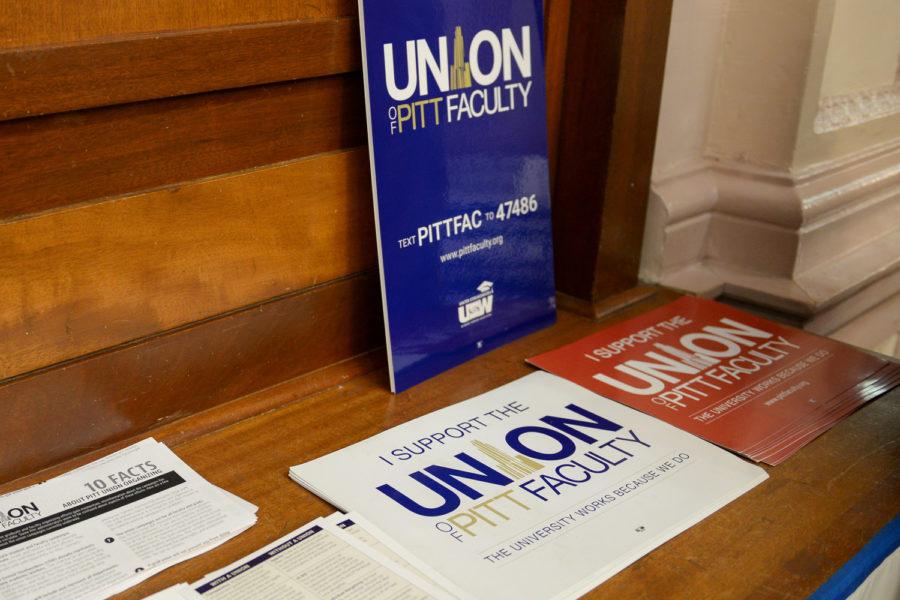Pa. House Democrats introduce pro-union bill, unlikely to impact Pitt


Proposed legislation by Pennsylvania House Democrats addresses unions and taxpayer dollars.
With Pitt faculty expected to vote on unionization this summer or fall, Pennsylvania House Democrats introduced a bill last month that would prohibit Pitt and other public employers from using taxpayer dollars to sway union support.
Several University faculty and students took to social media to applaud the proposed legislation, citing the $2 million Pitt has paid “union avoidance” law firm Ballard Spahr since 2016. But the bill is unlikely to impact the University’s upcoming faculty union election or future union battles, because state-related universities like Pitt — which receive money from the Commonwealth, but aren’t entirely public — are already forbidden from using taxpayer money to pay legal fees.
Pitt receives about $150 million from the Commonwealth every fiscal year. According to standard language in Pitt’s annual appropriations bill, Pitt can only use state funds for student instruction and “community outreach services.”
Rep. Dan Miller, who co-authored the new bill, said the legislation could affect many public employers in Pennsylvania. But in the case of Pitt and other state-related universities, the bill would simply double down on existing legislation.
When asked how the government could enforce the bill if Pitt and other state-related universities already don’t use their state appropriation to pay legal fees, Miller said, “To us, this is more a statement of principles.”
“Why this takes millions of dollars for the University of Pittsburgh to navigate, I don’t understand,” Miller said. “Whether or not employees vote to join a union is entirely up to those employees … we don’t want anyone unjustly putting their finger on the scale.”
Pitt spokesperson Kevin Zwick said the University uses its state appropriation exclusively to discount tuition for in-state students. He said last year that some of the payments to Ballard Spahr could come from student tuition.
“Pitt provided discounted tuition to Pennsylvania students and families worth $288 million in [fiscal year] 2020,” Zwick said. “Our state appropriation covers only less than 64% of that discount — the rest is covered by Pitt’s operating budget.”
The proposed legislation would amend the 1970 Public Employe Relations Act, which governs union policy in the public sector. It’s the first of its kind in Pennsylvania, but states like New Mexico already prohibit public entities from interfering with unionization efforts.
33 Democrats in the House have sponsored the bill, but it hasn’t received any Republican support. With Republicans currently controlling the House and Senate, Miller said Democrats might have to attach the bill to more bipartisan legislation to gather enough votes.
“I believe every Democrat would vote for this bill,” Miller said. “The challenge for us is that the Democrats are in the minority.”
Throughout the five years that Pitt has contracted with “union avoidance” law firm Ballard Spahr, organizers have repeatedly accused the University and its attorneys of using illegal tactics to derail unionization efforts.
After graduate student union organizers narrowly lost their election in April 2019, Labor Board hearing examiner Stephen Helmerich issued a proposed ruling in September 2019, saying Pitt committed “unfair labor practices” during and leading up to the graduate student union election. The hearing examiner subsequently ordered a new election, but the full Board overturned that ruling in March. It remains unclear whether graduate students will get another chance to vote on unionization.
A faculty union election is expected to take place later this summer, but the process to reach that point has taken years. The Labor Board initially ruled in April 2019 that organizers hadn’t collected enough signed authorization cards from faculty to trigger a union election.
But a Pitt News investigation published later that year found that Pitt had included hundreds of retirees and administrators on the union eligibility list, putting the requisite showing of interest just out of reach for organizers. Helmerich later ruled that Pitt’s eligibility list was “factually and legally inaccurate” and allowed faculty to move forward with an election.
Paul Johnson, an assistant professor of communications and faculty union organizer, said it’s “disheartening” to see Pitt continuing to spend money on a “union avoidance” law firm.
“Faculty are organizing precisely because they understand that electoral suppression efforts and restrictions on the faculty’s ability to participate in shared governance are antithetical to the values of a democratic workplace.”
Recent Posts
Opinion | School should be in the summer
Although this may be controversial, I believe that from this data, it is evident that…
Weathering the storm: Pittsburgh teams have tackled some of the toughest environments
The end of the year in western Pennsylvania is always marked by two things —…
Notes From an Average Girl // Notes on Book Banning
In this edition of Notes From an Average Girl, senior staff writer Madeline Milchman writes…
To Be Honest // Yup, it is that damn phone
In this edition of To Be Honest, staff writer Evin Verbrugge writes about her phone…
Meaning at the Movies | Portraying Toxic ‘Adolescence’
In this edition of Meaning at the Movies, staff writer Lauren Deaton explores the mini-series…
Opinion | Climate change requires radical, immediate action
Contributing editor Emma Hannan talks about the effects of climate change and the actions cities…

